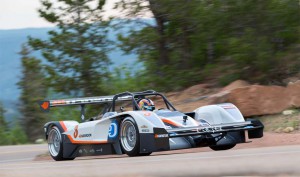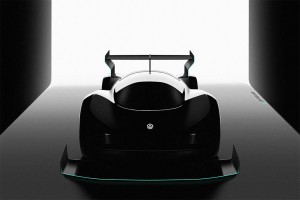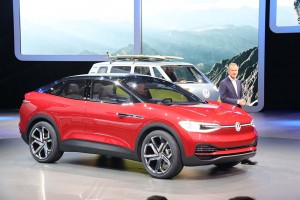Few automakers are doing more to plug into the emerging market for electrified vehicles than Volkswagen, the German company announcing last month it will invest $20 billion to develop a vast fleet of hybrids, plug-ins and pure battery-electric vehicles.
The big question is whether there’s a market for all those new models, so VW is taking a page from the Automotive Marketing 101 handbook and tweaking it ever so slightly. “Win on Sunday, Sell on Monday,” goes the old adage. And if it works for classic, internal combustion vehicles, why not try it for your battery cars, as well?
So, VW is giving us a first look at the all-wheel-drive battery-electric that it will use to challenge the grueling Pike’s Peak International Hill Climb next year, Sven Smeets, Volkswagen’s Motorsport Director telling us, ” Our team is literally electrified about taking on this incredible challenge” — which happens to mark the first time in 30 years the company will have campaigned at the Pike’s Peak Climb.
The German automaker isn’t saying much about the prototype it is teasing in a new sketch released this morning. About the only thing we know for sure is that it will feature all-wheel-drive and a GTP-like body with a massive front chin spoiler and a high rear wing.

VW motorsports officials want to top the record of 8 minutes 57.118 seconds, set by Rhys Millen in an electric prototype in 2016.
Whether the as yet-unnamed racer will use twin or quad motors – and whether they will be axle or wheel-mounted – well, stay tuned. We’re expecting that whichever way VW engineers go they will deliver electric torque vectoring to improve the way the car schusses around the tough Pike’s Peak course.
“Our electric race car will be equipped with innovative battery and drive technology,” hints Frank Welsch, the VW board member responsible for vehicle development.
(VW latest to target EV heavy truck market. For the story, Click Here.)
Racers not only have to maneuver around a seemingly endless series of corners – many with sheer drop-offs awaiting an inattentive driver or a broken car – but over the 12.4 miles a vehicle will climb 4,700 feet. No wonder it is often known as “The Race to the Clouds.”
One good bit of news: electric motors don’t suffer from altitude sickness. They don’t care that the air is getting thinner the higher you climb, unlike air-breathing internal combustion engines.
That helps explain why we’ve been seeing more and more automakers challenge the Peak with electric racers in recent years, brands as diverse as VW sibling Audi to little Japanese maker Mitsubishi.
VW motorsports officials tell us they’ve already set a goal for themselves: topping the record 8 minutes 57.118 seconds, set by Rhys Millen in an electric prototype in 2016. Who knows if they might push even further and go for the overall record of 8 minutes 13.878 seconds set in a conventionally powered vehicle back in 2013.
(VW partnering with Navistar on all-electric truck. Click Here for more.)
Pike’s Peak has been one of the showcases for electric race technology, said VW board member Welsch. “It poses an enormous challenge and is therefore perfectly suited to proving the capabilities of upcoming technologies.” Challenging the mountain “will give us important feedback that will benefit future development, and it will showcase our products and their technologies.”
Battery technology is expected to be used to power millions of vehicles in the coming years. For its part, the Volkswagen Group plans to offer 23 all-electric models by 2025, as well as dozens of conventional hybrids and plug-ins. And it’s not alone. Volvo plans to offer only electrified drivelines in all models launched from 2018 on. GM this month said it will have 20 battery-electric vehicles by 2023, and will move to offering only all-electric models at some unspecified date to come.
In part, the industry is being driven by tough new global emissions and mileage rules. Norway and India are planning to ban internal combustion vehicles in the coming decade, and the UK, France, Germany and China are considering similar moves. So is the State of California and if it does, another 11 states that have adopted California’s tougher emissions rules would follow suit.
The challenge is winning over consumers. One way is to go back to basic marketing to show that tomorrow’s electric vehicles will not be the boringly slow models of recent years. Tesla, for example, can hit 60 in barely 2.3 seconds in its Model S P100d with optional Ludicrous Mode and hints of even faster models to come.
(VW moves closer to production with new I.D. Crozz EV. Click Here for the latest.)
Manufacturers are looking for various ways to promote EV performance, and that includes the Formula-E series that launched its inaugural season three years ago.


